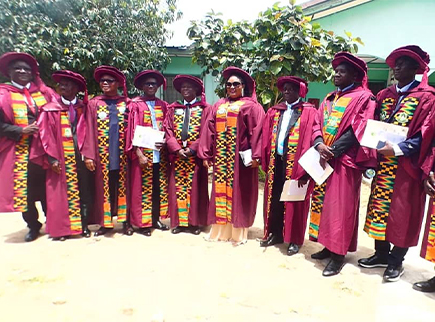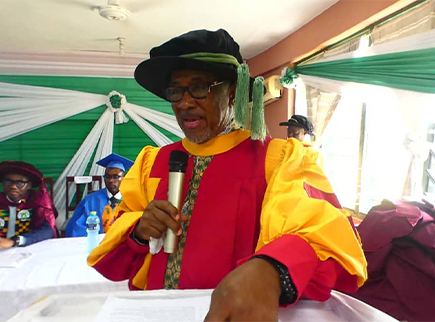Eleven students have graduated with Doctor of Philosophy (PhD) degrees in Development and Culture from the Millar Institute for Transdisciplinary and Development Studies (MITDS) after successfully completing a rigorous four-year academic programme.
The seventh graduation ceremony, held at the MITDS campus in Bolgatanga in the Upper East Region, marked yet another academic milestone for the institute, which is affiliated with the University for Development Studies (UDS).
Delivering his address at the ceremony, Professor David Millar, the President of MITDS, disclosed that the institute was preparing to introduce several new PhD programmes aimed at strengthening indigenous knowledge systems and addressing contemporary development challenges from an African perspective.
He mentioned that plans were far advanced to launch PhD programmes in Contemporary Development Communication Studies, Communication Systems, Indigenous Technology and Innovation Studies, under the Faculty of Indigenous and Communication Studies.

Other forthcoming programmes include Gender and Generational Learning, Indigenous and Lifelong Learning, and Soft Science Education under the Faculty of Indigenous Education and Lifelong Learning. Additionally, PhD programmes in Culture and Development Studies, Decolonization and Heritage Studies are to be offered under the Faculty of Culture and Development Studies.
Professor Millar also highlighted the growing contribution of MITDS to Ghana’s national development agenda.
He noted that since its inception in 2014, the institute had produced over 37 PhD graduates in addition to numerous other postgraduate students, many of whom were actively contributing to both the public and private sectors.
He further emphasised the institute’s commitment to locally relevant research that produces home-grown solutions and cited for example the Grass Charcoal Briquette (GARWASI) Project, an innovation that sought to replace traditional tree-based charcoal with sustainable grass-based briquettes.
This project, he said, has caught the attention of the Food and Agriculture Organization (FAO) and that another breakthrough from the institute was the development of brown paper using local grasses, as well as the transformation of grasses into biochar to improve soil fertility, especially on fragile lands.
Professor Millar stated that these innovations held great potential to trigger the emergence of a major grass-based industry in Northern Ghana, adding that grass, once considered a nuisance in the region, could now be reimagined as an economic commodity capable of mitigating the adverse effects of perennial bushfires.
According to him, this would also serve as a proactive response to climate change through carbon sequestration, adding that such innovations reflected the institute’s vision of promoting development through indigenous knowledge systems.
Naa Ganglaar Bog-Belagr Tater V, the Chairman of the MITDS Council, also reaffirmed MITDS’s strong academic track record and announced that the Ghana Tertiary Education Commission (GTEC) had reaccredited the institute to continue running its postgraduate programmes.
He disclosed that MITDS had also received institutional reaccreditation, reaffirming its credibility and commitment to quality education.
He, however, appealed to the government, corporate bodies, and philanthropists to support the institute with infrastructure such as a modern library complex, enhancement of ICT infrastructure, and the establishment of a well-equipped conference hall.
He emphasized that while MITDS continued to play a vital role in national development, the needed investment in academic infrastructure was critical for the institute to expand its impact and continue producing high-level professionals who were well-versed in indigenous, practical, and transformative approaches to development.

